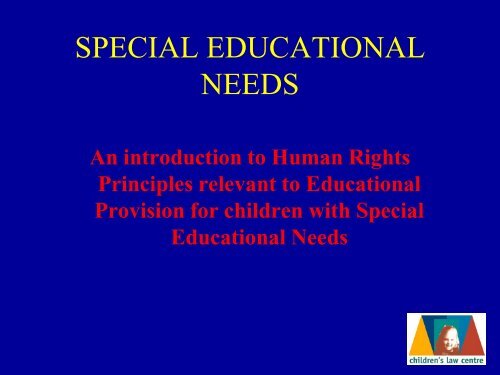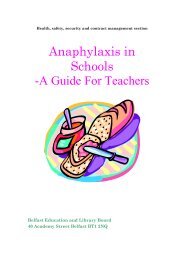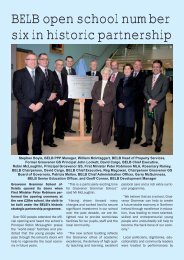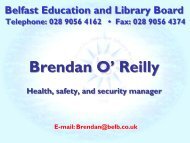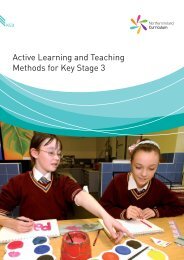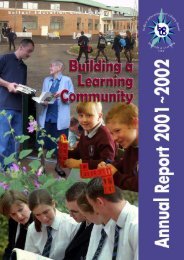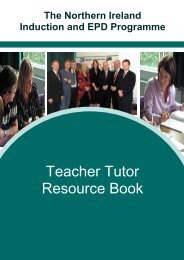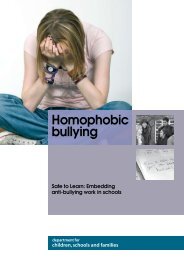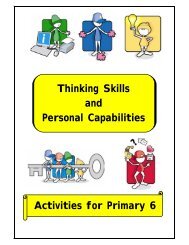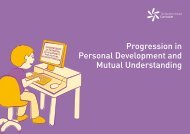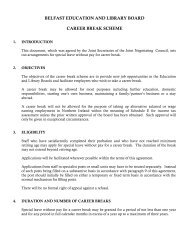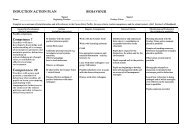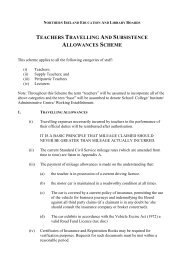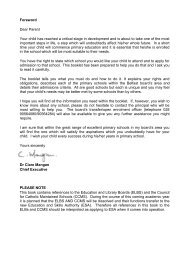SPECIAL EDUCATIONAL NEEDS
SPECIAL EDUCATIONAL NEEDS
SPECIAL EDUCATIONAL NEEDS
- No tags were found...
You also want an ePaper? Increase the reach of your titles
YUMPU automatically turns print PDFs into web optimized ePapers that Google loves.
<strong>SPECIAL</strong> <strong>EDUCATIONAL</strong><strong>NEEDS</strong>An introduction to Human RightsPrinciples relevant to EducationalProvision for children with SpecialEducational Needs
Duties of the Board of Governors• Article 4(2) requires ELBs and BoGs of Grant-Aided schools ‘to have regard to the provisionscontained within the Code’• Article 9 of the Education (NI) Order 1996 placesBoGs under a strict obligation to ensure that aschool has a policy on SEN• BoGs required to produce details of SENprovision in its annual report
Five Stages in the Code of Practice• Stage 1 the child’s teacher should record anyconcerns about learning difficulty and speak to theparents• Stage 2 the SENCO should discuss the child’sdifficulties with parents and teachersand draw up Educational Plan (EP)• Stage 3 School will probably seek outsidespecialist help• Stage 4 Statutory Assessment is requested fromthe ELB• Stage 5 Statement is drafted
Article 2, Protocol 1(ECHR)‣ Schools must ensure that all children with SENreceive an effective education‣ This includes children:‣ Who are without a statement;‣ those awaiting assessment;‣ those appealing a decision regarding their SENprovision; and‣ those with a statement
Article 2, Protocol 1(ECHR)‣ Schemes of Work should reflect to the wholeschool policy on SEN and detail procedures forliaison with the SENCO in respect of individualpupils.‣ Educational Plans for individual pupils should bedevised.‣ Progress of individual pupils should be closelymonitored and evaluated.
Article 14(ECHR)‣May be challenged where a child isdiscriminated against in relation to their right ofaccess to an effective education, on thegrounds of their disability or SEN‣Children with Emotional and BehaviouralDifficulty will require close monitoring andassessment under the Code of Practice‣They may require an Education Plan (EP)and/or behavioural support
Article 14(ECHR)‣ School disciplinary procedures and SEN:‣ Pupils with EBD may be more susceptible tosuspension and expulsion‣ School Managers should carefully monitor pupilresponse to disciplinary measures‣ Pupils should never be expelled solely on the basisof their SEN
Article 12 (UNCRC)‣ The ‘voice of the child’ should be taken intoaccount at all stages of the Code of Practice wherea child is of the age and maturity to express theirown views.‣ The Code of Practice recommends involvement ofthe child in decision- making processes atparagraphs 2.28,2.29, 2.48, 3.59, 6.49 and 6.50.
Article 23 (UNCRC)‣ Article 23 strongly promotes social integration andactive participation for children through the mediumof education‣ Article 23 also aims to promote access to an effectiveeducation.‣ All children with SEN and disability should beprovided with the opportunity to access the NorthernIreland Curriculum at a level which is consistent withtheir ability and aptitude.‣ Modification of the curriculum may be necessary toensure that individual needs are met
Inclusion in mainstreameducation• Article 7 of the Education (NI) Order 1996,provides a ‘qualified duty to secure education inordinary school’ for statemented pupils• Educating the child in a mainstream school mustbe compatible with:– The child receiving the provision which his learningdifficulty calls for– Provision of efficient education for the children withwhom he will be educated– The efficient use of resources
Special Educational Provision‣ Non-statemented children may be providedadditional resources from a number of sources:‣their school’s Special Educational Needsbudget (not ring fenced)‣At Stage 3 of the Code of Practice, outreachsupport may be provided by the ELB‣Under Article 86 of the Education (NI) Order1998
Key Human Rights Issues forChildren with SEN• (1) Early identification of SEN- Unreasonable delay may lead to a breach ofArticle 2, Protocol 1 (ECHR).• (2) Emotional and Behavioural Difficulties(EBD) should be universally recognised as aspecial educational need (Reflected inthe Code of Practice Appendix at A.10 – A.13)
Key Human Rights Issues forChildren with SEN• (3) Of children with SEN, pupil’s with EBD aremore susceptible to suspension and expulsion.Schools should be mindful of Article 2, Protocol1 and Article 14 (ECHR) – A child should neverbe expelled solely because of their SEN.• (4) Article 12 (UNCRC) states that children havea right to be consulted and express their views ondecisions that affect them
Key Human Rights Issues forChildren with SEN• (5) Non-statemented pupil’s and those awaitingassessment sometimes do not receive theappropriate assistance-Future challenges may be raised underArticle 2, Protocol 1 and Article 14 (ECHR).• (6) Pupil’s out of school due to illness shouldreceive effective provision– Article 86 of the Education (NI) Order 1998There is a need for clear guidance
Key Human Rights Issues forChildren with SEN• (7) There is still inequality of access for childrenwith physical disability to schools- new legislation is proposed in Northern Ireland(equivalent to SENDA)• (8) School admission policies may indirectlydiscriminate against children with disability
Key Human Rights Issues forChildren with SEN• (9) Training Needs – SEN is a huge umbrella termfor a vast array of specific learning difficulties,disabilities and specialist needs• Principals, teachers and SENCOs should receiveongoing training to:– Promptly identify need– Make appropriate referrals– Utilise relevant support services in ELBs
CASE 1 –Phelps v Hillingdon B.C.& Others• This case deals with negligence and establishesthe duty of care towards children with SEN• FACTS• The plaintiff was referred to the LEA’seducational psychologist for assessment of herSEN• No specific weakness was traced• Shortly before leaving school, she was diagnosedwith dyslexia• She brought a claim against the LEA
CASE 1 –Phelps v Hillingdon B.C.& Others• The findings of the HOL’s:• The Educational Psychologist owed a duty of care to thechild assessed• The child and her parents relied on the advice given• The LEA were vicariously liable• The assessment was negligent• Consequences: The girl was unable to proceed to theemployment envisaged• £44,000 damages were awarded for loss offuture earnings
CASE 1 –Phelps v Hillingdon B.C.& Others• Implications of HOL’s Findings:• LEA’s have a legal duty to ensure that pupil’sSEN are met• LEA’s are liable for the negligent actions of aneducational psychologist and potentially otherofficers and agents
CASE 1 –Phelps v Hillingdon B.C.& Others• What about teachers, principals and schoolmanagers?• The parameters are unclear• HOL’s emphasised that liability is exceptional• The claimant must establish that the serviceprovided ‘fell below the standard expectedof a reasonable body of similarly professionalpeople’
Suggested Actions• What can school managers do to help ensure thattheir internal policy and procedures protect therights of children with SEN? Ensure that staff make prompt reference to theCode of Practice for identification and assessmentof the child’s needs School policies should specifically refer to theCode of Practice to promote awareness amongschool staff
Suggested Actions Staff should routinely be reminded of the schoolsSEN policy, the content of the Code of Practiceand their professional responsibilities towardschildren with SEN Periodic training highlighting SEN research anddevelopments Partnership with parents is recommended underparagraphs 2.21-2.27 of the Code)
Suggested Actions It is good practice for schools to develop strategiesand support networks with ELB Support Services The school Discipline Policy should be crossreferencedwith the SEN Policy - SENCO shouldprovide relevant information regarding pupils withSEN who face suspension or expulsion
Suggested Actions With reference to Article 12 (UNCRC),procedures for participation of children should beincluded in the school’s SEN policy. Involvementof the child is advised throughout the Code atparagraphs 2.28,2.29, 2.48, 3.59, 6.49 and 6.50. Social inclusion must be the bedrock of anyeducational experience and should be reflected inthe school’s SEN Policy (Article 23 UNCRC)


